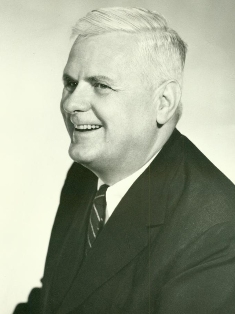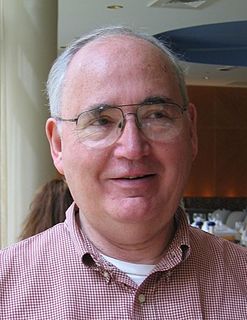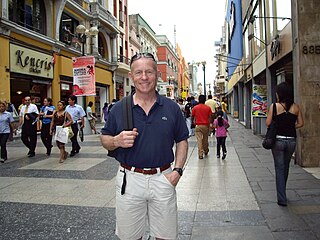Curtis Anthony Anderson (born May 29, 1940) is a contemporary American philosopher, currently Professor of Philosophy at the University of California at Santa Barbara. He earned his Ph.D. in philosophy from University of California at Los Angeles in 1977, where he worked closely with the renowned logician Alonzo Church. He also holds an M.S. in mathematics from the University of Houston (1965), where he earned his undergraduate degree in physics and mathematics (1964).
Anderson's work over the years has focused primarily in the philosophy of logic and the philosophy of language, although he also works in such areas as the philosophy of religion and has an interest in most areas of traditional philosophy.
Prior to his professorship at U.C. Santa Barbara, Dr. Anderson held posts notably at the University of Minnesota at Minneapolis, and the University of Texas at Austin.

Alonzo Church was an American mathematician and logician who made major contributions to mathematical logic and the foundations of theoretical computer science. He is best known for the lambda calculus, Church–Turing thesis, proving the unsolvability of the Entscheidungsproblem, Frege–Church ontology, and the Church–Rosser theorem. He also worked on philosophy of language.

Rudolf Carnap was a German-language philosopher who was active in Europe before 1935 and in the United States thereafter. He was a major member of the Vienna Circle and an advocate of logical positivism. He is considered "one of the giants among twentieth-century philosophers."

The history of logic deals with the study of the development of the science of valid inference (logic). Formal logics developed in ancient times in India, China, and Greece. Greek methods, particularly Aristotelian logic as found in the Organon, found wide application and acceptance in Western science and mathematics for millennia. The Stoics, especially Chrysippus, began the development of predicate logic.

Analytic philosophy is a branch and tradition of philosophy using analysis which is popular in the Western World and particularly the Anglosphere, which began around the turn of the 20th century in the contemporary era and continues today. In the United Kingdom, United States, Canada, Australia, New Zealand and Scandinavia, the majority of university philosophy departments today identify themselves as "analytic" departments.

Dana Stewart Scott is an American logician who is the emeritus Hillman University Professor of Computer Science, Philosophy, and Mathematical Logic at Carnegie Mellon University; he is now retired and lives in Berkeley, California. His work on automata theory earned him the Turing Award in 1976, while his collaborative work with Christopher Strachey in the 1970s laid the foundations of modern approaches to the semantics of programming languages. He has worked also on modal logic, topology, and category theory.

Ian MacDougall Hacking is a Canadian philosopher specializing in the philosophy of science. Throughout his career, he has won numerous awards, such as the Killam Prize for the Humanities and the Balzan Prize, and been a member of many prestigious groups, including the Order of Canada, the Royal Society of Canada and the British Academy.

Ruth Barcan Marcus was an American academic philosopher and logician best known for her work in modal and philosophical logic. She developed the first formal systems of quantified modal logic and in so doing introduced the schema or principle known as the Barcan formula. Marcus, who originally published as Ruth C. Barcan, was, as Don Garrett notes "one of the twentieth century's most important and influential philosopher-logicians". Timothy Williamson, in a 2008 celebration of Marcus' long career, states that many of her "main ideas are not just original, and clever, and beautiful, and fascinating, and influential, and way ahead of their time, but actually – I believe – true".

David Kellogg Lewis was an American philosopher who is widely regarded as one of the most important philosophers of the 20th century. Lewis taught briefly at UCLA and then at Princeton University from 1970 until his death. He is closely associated with Australia, whose philosophical community he visited almost annually for more than 30 years.
Clarence Irving Lewis, usually cited as C. I. Lewis, was an American academic philosopher and the founder of conceptual pragmatism. First a noted logician, he later branched into epistemology, and during the last 20 years of his life, he wrote much on ethics. The New York Times memorialized him as "a leading authority on symbolic logic and on the philosophic concepts of knowledge and value."

Richard Merritt Montague was an American mathematician and philosopher.
David Benjamin Kaplan is an American philosopher. He is the Hans Reichenbach Professor of Scientific Philosophy at the UCLA Department of Philosophy. His philosophical work focuses on the philosophy of language, logic, metaphysics, epistemology and the philosophy of Frege and Russell. He is best known for his work on demonstratives, propositions, and reference in intensional contexts. He was elected a Fellow of the American Academy of Arts & Sciences in 1983 and a Corresponding Fellow of the British Academy in 2007.
Richard Milton Martin was an American logician and analytic philosopher. In his Ph.D. thesis written under Frederic Fitch, Martin discovered virtual sets a bit before Quine, and was possibly the first non-Pole other than Joseph Henry Woodger to employ a mereological system. Building on these and other devices, Martin forged a first-order theory capable of expressing its own syntax as well as some semantics and pragmatics, all while abstaining from set and model theory, and from intensional notions such as modality.
Jerry R. Hobbs is an American researcher in the fields of computational linguistics, discourse analysis, and artificial intelligence.
Stewart Shapiro is O'Donnell Professor of Philosophy at the Ohio State University. He is a leading figure in the philosophy of mathematics where he defends the abstract variety of structuralism.
Pavel Tichý was a Czech logician, philosopher and mathematician.
Frederic Brenton Fitch was an American logician, a Sterling Professor at Yale University.

Stephen Yablo is a Canadian-born American philosopher. He is David W. Skinner Professor of Philosophy at the Massachusetts Institute of Technology (MIT), and taught previously at the University of Michigan, Ann Arbor. He specializes in the philosophy of logic, philosophy of mind, metaphysics, philosophy of language, and philosophy of mathematics.

Meaning and Necessity: A Study in Semantics and Modal Logic is a book about semantics and modal logic by the philosopher Rudolf Carnap. The book, in which Carnap discusses the nature of linguistic expressions, was a continuation of his previous work in semantics in Introduction to Semantics (1942) and Formalization of Logic (1943). Considered an important discussion of semantics, it was influential and provided a basis for further developments in modal logic.

Matthias Schirn is a German philosopher and logician.
Pavel Materna is a Czech philosopher, logician and key representative of transparent intensional logic.